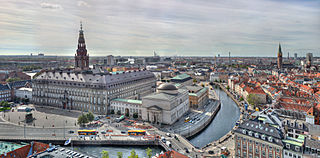
Copenhagen is the capital and most populous city of Denmark, with a population of around 660,000 in the municipality and 1.4 million in the urban area. The city is on the islands of Zealand and Amager, separated from Malmö, Sweden, by the Øresund strait. The Øresund Bridge connects the two cities by rail and road.
Irma was a high-end chain of supermarkets in Copenhagen and other parts of eastern Denmark. Its first store was established in 1886 by Karen Marie Schepler. On 31 January 2023 Irma's owners, Coop Danmark, announced that all Irma supermarkets would be rebranded or closed within the course of the year.
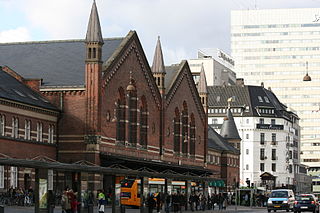
Copenhagen Central Station is the main railway station in Copenhagen, Denmark, and the largest railway station in Denmark. With more than 100,000 travellers every day, it is the second busiest station in Denmark after Nørreport station. It is located in central Copenhagen, situated between the districts of Indre By and Vesterbro with entrances from Bernstorffsgade, Banegårdspladsen, Reventlowsgade and access to platforms from Tietgensgade.

City Hall Square is a public square in the centre of Copenhagen, Denmark, located in front of the Copenhagen City Hall. Its large size, central location, and affiliation with the city hall makes it a popular venue for a variety of events, celebrations and demonstrations. It is often used as a central point for measuring distances from Copenhagen.

Vesterbrogade is the main shopping street of the Vesterbro district of Copenhagen, Denmark. The 1.5 km long street runs from the City Hall Square in the east to Pile Allé in Frederiksberg in the west where it turns into Roskildevej. On its way, it passes Copenhagen Central Station as well as the small triangular square Vesterbros Torv. It is one of four such -bro streets, the other being Nørrebrogade, Østerbrogade and Amagerbrogade.

Frederiksberg Allé is a tree-lined avenue which runs through the southernmost part of the Frederiksberg district of Copenhagen, Denmark. It connects Vesterbrogade at Værnedamsvej to Frederiksberg Runddel in front of the main entrance to Frederiksberg Gardens. It was originally constructed in 1704 as the king's private road leading to his new summer residence, Frederiksberg Palace. It developed into the backbone of an entertainment district in the mid 18th century, and has continued to be associated with theatres until the present day. The avenue is lined with two double rows of linden trees and bisects Sankt Thomas Plads, a small round plaza, shortly after its departure from Vesterbrogade.
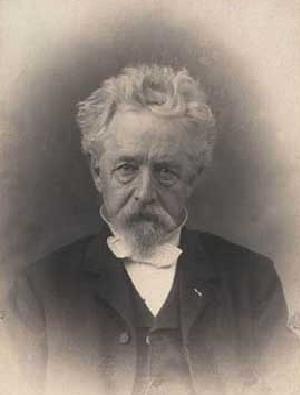
Vilhelm Klein was a Danish architect who adopted the Historicist approach, frequently emulating the so-called Rosenborg style and the Italian Renaissance style.

Savoy Hotel Copenhagen is a 66-room, privately run hotel located at Vesterbrogade 34 in the Vesterbro district of Copenhagen, Denmark. The hotel is based in the rear wing of the Løvenborg Building, Denmark's first example of Art Nouveau.
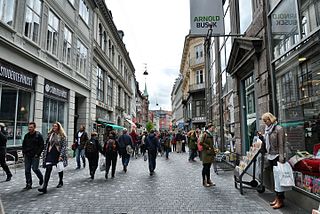
Købmagergade is a pedestrian shopping street in the Old Town of Copenhagen, Denmark. It connects Amagertorv on Strøget to Nørreport station, although the last section, north of Kultorvet, is part of Frederiksborggade, which continues on the other side of the railway station.

Axelborg, located across the street from Tivoli Gardens on Vesterbrogade in Copenhagen, Denmark, is home to the Danish Agriculture and Food Council. DLG Group is also headquartered in the building. The building was built in 1920 and was originally constructed for a bank. An Irma flagship store opened on the ground floor in 2015 and a Vivalde Café is located on the side that faces Axeltorv..

National Scala was an entertainment venue opposite Tivoli Gardens on Vesterbrogade in Copenhagen, Denmark. The building was later converted into a shopping centre and demolished in 2013.

Industriens Hus is the home of the Confederation of Danish Industries. The building is located at the corner of H. C. Andersens Boulevard and Vesterbrogade, opposite the City Hall Square, in Copenhagen, Denmark. It also contains a showroom for green technologies, House of Green, as well as a series of two-storey flagship stores and restaurants on Vesterbrogade.
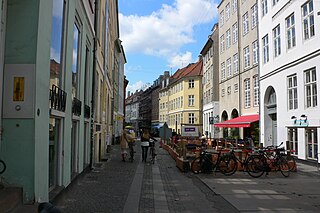
Strædet is the colloquial name of a popular shopping and café street in the Old Town of Copenhagen, Denmark, linking Højbro Plads on Strøget at its eastern end with Regnbuepladsen next to City Hall to the west. The official street names are Læderstræde, Kompagnistræde and Farvergade. The shops along the street are generally smaller and more eclectic than the flagship stores on neighbouring Strøget. It is dominated by art galleries and antique shops. It is known for its rich gay culture with LGBT citizens, shops, bars, restaurants and coffeehouses.
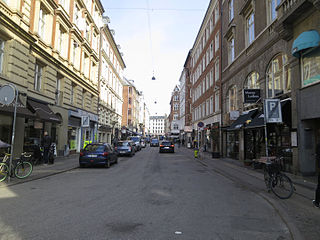
Værnedamsvej is a lively shopping street, linking Vesterbrogade and the beginning of Frederiksberg Allé with Gammel Kongevej on the border between Frederiksberg and Vesterbro in central Copenhagen, Denmark. The street was formerly known for its many specialized food stores, but is now dominated by fashion boutiques and cafés. Tullinsgade is a side street to Værnedamsvej and makes a 90 degree turn before joining Gammel Kongevej.

Bernstorffsgade is a street located next to Central Station and Tivoli Gardens in central Copenhagen, Denmark. It runs from Vesterbrogade in the northwest to Kalvebod Brygge on the harborfront in the southeast, and marks the boundary between the districts Indre By and Vesterbro.
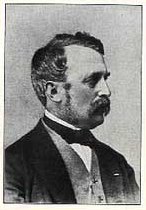
Harald Conrad Stilling was a Danish architect who was active in Copenhagen during the Late Classical period of the mid-18th century. He received the C. F. Hansen Medal in 1841.
Vilhelm Heinrich Friederichsen was a Danish architect.

Meyer Herman Bing was a Danish businessman. He was a co-founder of Bing & Grøndahl.

Illums Bolighus is a retailer of household furnishings based in Copenhagen, Denmark. The original Illums Bolighus flagship store is located at Amagertorv 10 in central Copenhagen. The company was in 2005 acquired by an investor group headed by CEO Henrik Ypkendanz and has since then opened a number of new stores in Denmark, Norway, Sweden and Germany.
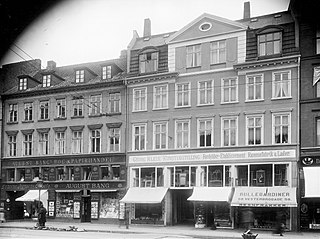
Kleis' Kunsthandel was a commercial art gallery, frame shop and gilder's business in Copenhagen, Denmark. It developed into one of the leading art dealers in the city under the management of Vakdemar Kleis, its owner from 1878 until 1918. It was based at Vesterbrogade 58 from 1878 until 1972. It hosted the first Den Frie Udstilling in 1891. Another branch was located at Østergade 4. It closed in 1988.





















